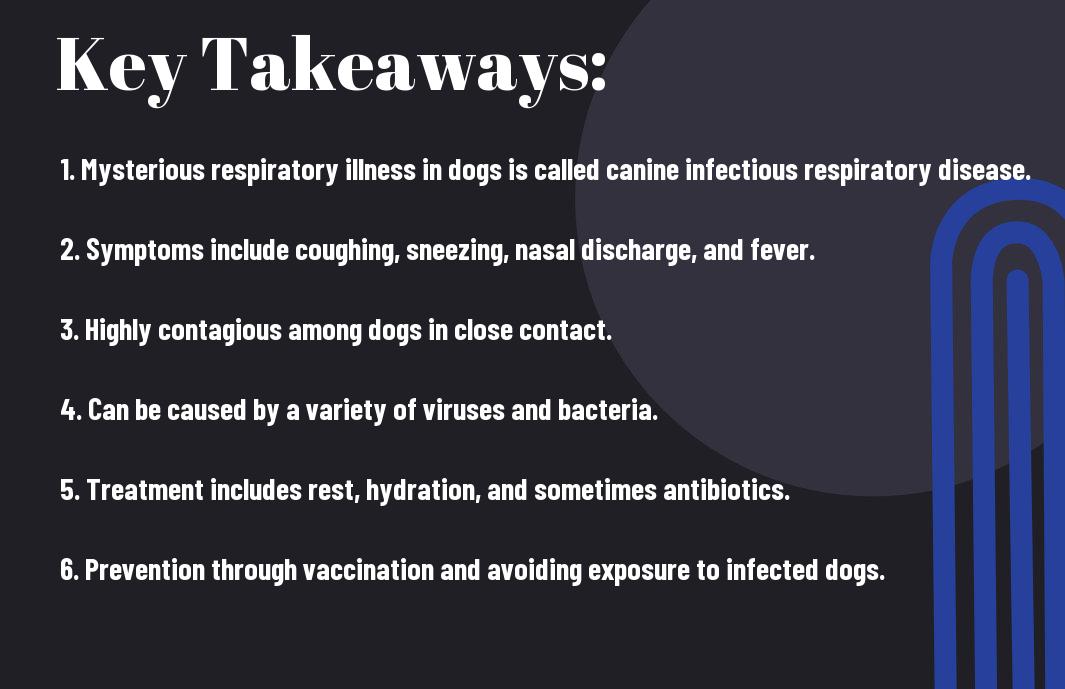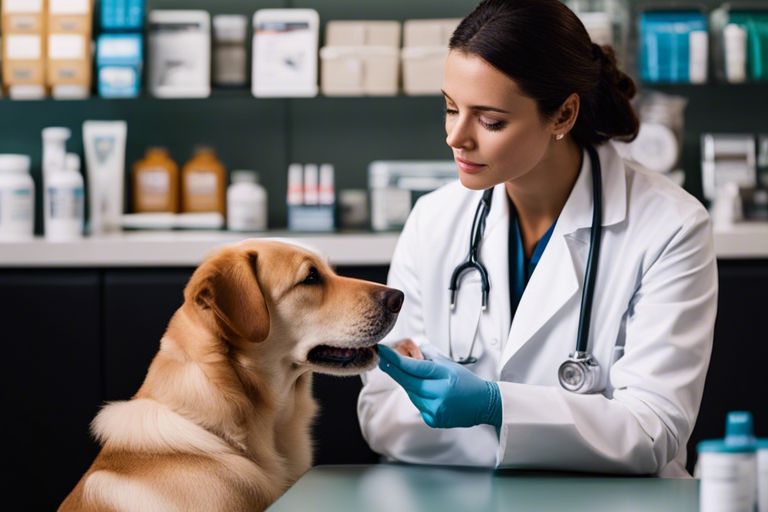Just like how astronomers explore the depths of the universe, veterinarians are delving into the enigmatic world of a strange respiratory illness affecting dogs. You might be wondering, what exactly is this mysterious ailment that is causing concern among pet owners and veterinarians alike? In this informative piece, let’s uncover the facts surrounding this puzzling canine respiratory illness, its symptoms, potential causes, and how you can protect your furry companion from this mysterious threat.
Key Takeaways:
- Mysterious Respiratory Illness: Dogs are being affected by a mysterious respiratory illness causing symptoms such as coughing, difficulty breathing, nasal discharge, and lethargy.
- Not Yet Identified: The cause of this illness has not been identified yet, but it seems to be highly contagious among dogs and can spread quickly in places like kennels or shelters.
- Preventive Measures: Pet owners are advised to take precautions such as avoiding areas where the illness has been reported, practicing good hygiene, and seeking veterinary care if their dog shows any symptoms.
The Mysterious Respiratory Illness
To understand the mysterious respiratory illness affecting dogs, you must familiarize yourself with its symptoms and diagnosis.
Symptoms and Diagnosis
Respiratory symptoms in dogs suffering from this mysterious illness can include coughing, sneezing, nasal discharge, and difficulty breathing. In severe cases, affected dogs may develop pneumonia. Diagnosis of this condition can be challenging due to its similarity to other respiratory infections. Your veterinarian may conduct a physical examination, blood tests, and imaging studies to reach a definitive diagnosis.
Prevalence and Geographic Distribution
Geographic location plays a significant role in the prevalence of this respiratory illness in dogs. It has been reported in various regions across the country, with some areas experiencing higher rates of infection than others.
It is crucial to stay informed about the prevalence and distribution of this mysterious respiratory illness, especially if you live in an area where cases have been identified. Taking preventive measures and seeking prompt veterinary care if your dog displays any symptoms can help protect your furry companion.
Possible Causes and Risk Factors
While the exact cause of the mysterious respiratory illness in dogs is still being investigated, there are several possible factors that could contribute to the development of this condition. Here are some of the potential causes and risk factors to consider:
-
Environmental Toxins and Pollutants
One possible cause of the respiratory illness in dogs could be exposure to environmental toxins and pollutants. Dogs who are regularly exposed to cigarette smoke, air pollution, or other harmful substances may be at a higher risk of developing respiratory problems.
Thou, as a dog owner, can help reduce your pet’s risk by limiting their exposure to these harmful substances and providing a clean and healthy environment for them to live in.
-
Genetic Predisposition
On the other hand, genetic predisposition could also play a role in the development of respiratory illnesses in dogs. Some breeds may be more susceptible to certain respiratory conditions due to their genetics.
It is imperative to be aware of your dog’s breed and any known genetic health issues that may put them at a higher risk for respiratory problems. By staying informed, you can work with your veterinarian to develop a proactive healthcare plan for your furry friend.
Viral and Bacterial Infections
Environmental factors such as exposure to viral and bacterial infections can also contribute to respiratory illnesses in dogs. Dogs who come into contact with other sick animals or contaminated environments may be at risk of developing infections that affect their respiratory system.
This emphasizes the importance of keeping your dog’s vaccinations up to date and avoiding contact with sick animals in parks or other public places. By taking proper precautions, you can help protect your dog from potential respiratory infections.
The Role of Veterinary Medicine
Many dog owners turn to veterinary medicine to diagnose and treat the mysterious respiratory illness affecting their beloved pets. Veterinarians play a crucial role in identifying the underlying cause of the illness and developing a suitable treatment plan to help your furry friend recover.
Diagnostic Tools and Techniques
Veterinary professionals use a range of diagnostic tools and techniques to investigate the respiratory symptoms in dogs. These may include physical examinations, blood tests, X-rays, ultrasounds, and even more advanced procedures like bronchoscopy or CT scans. By utilizing these tools, veterinarians can gain a better understanding of the extent and nature of the illness, guiding them towards an accurate diagnosis.
Treatment Options and Challenges
Tools in veterinary medicine for treating respiratory illnesses in dogs include a combination of medication, oxygen therapy, and sometimes surgical intervention. The challenge lies in identifying the most effective treatment approach, as the underlying cause of the illness may vary from case to case. Additionally, some respiratory conditions in dogs can be complex and may require long-term management to ensure your pet’s well-being.
Options for treatment may also involve lifestyle adjustments, such as changes in exercise routine or diet, to support your dog’s respiratory health. Your veterinarian will work closely with you to determine the best course of action based on your pet’s specific condition and needs. Together, you can navigate the challenges posed by this mysterious respiratory illness and provide the best possible care for your canine companion.
Breeds and Ages Affected
Now let’s explore which breeds are more susceptible to the mysterious respiratory illness in dogs and how age plays a role in vulnerability.
Susceptible Breeds and Characteristics
Ages are factors that play a role in the susceptibility of certain breeds to the mysterious respiratory illness in dogs. Some breeds display a higher vulnerability due to genetic predispositions or physical characteristics. Brachycephalic breeds, such as Bulldogs, Pugs, and Boston Terriers, are more at risk due to their anatomical features, like narrowed airways and flat faces, which can make breathing more challenging. Additionally, smaller breeds may be more prone to respiratory issues because of their delicate respiratory systems.
Age-Related Factors and Vulnerabilities
Characteristics such as age also influence the likelihood of a dog being affected by the respiratory illness. Puppies and senior dogs are more vulnerable due to their less developed or weakened immune systems, respectively. Puppies may not have fully matured immune responses, making them more susceptible to infections, while older dogs may have decreased immune function, leaving them less able to fight off illnesses effectively. This reduced immune response can make them more prone to developing respiratory issues.
- This highlights the importance of monitoring your puppy or senior dog for any signs of respiratory distress and seeking prompt veterinary care if needed.
A dog’s age and breed are crucial factors in understanding their susceptibility to the mysterious respiratory illness. As a dog owner, you must be vigilant in observing any changes in your furry companion’s breathing patterns or overall health. Always consult your veterinarian if you have any concerns about your dog’s respiratory well-being.
Prevention and Control Measures
Reducing Environmental Risks
For your furry companion’s health and well-being, it’s crucial to reduce environmental risks that could contribute to the spread of the mysterious respiratory illness in dogs. Ensure your dog has a clean and hygienic living space, free of potential respiratory irritants such as cigarette smoke, air pollutants, and mold. Regularly clean your dog’s bedding, toys, and food and water bowls to prevent the buildup of harmful bacteria and viruses.
Vaccination and Immune System Support
Environmental factors alone may not be enough to protect your dog from the mysterious respiratory illness. Vaccination is a key component in safeguarding your furry friend against this potentially dangerous disease. Consult with your veterinarian to ensure your dog is up to date on all necessary vaccinations and consider additional immune system support through supplements or a balanced diet rich in vitamins and antioxidants.
With a combination of preventive measures, including reducing environmental risks and supporting your dog’s immune system through vaccination and proper nutrition, you can help minimize the risk of your beloved pet contracting the mysterious respiratory illness.
Ongoing Research and Investigation
Scientific Studies and Findings
An ongoing research effort is necessary in unraveling the mysteries behind the unidentified respiratory illness affecting dogs. As scientists examine deeper into studying the cause and potential treatments, various studies and findings are emerging to shed light on this perplexing condition. Researchers are conducting extensive investigations to identify the specific pathogens or environmental factors that may be triggering the illness.
Collaborative Efforts and Future Directions
With collaboration being a cornerstone of scientific progress, experts from different fields are joining forces to address the enigmatic respiratory illness in dogs. By working together, veterinarians, pathologists, immunologists, and other specialists can pool their expertise and resources to gain a more comprehensive understanding of the disease. Future directions may involve large-scale collaborative studies, data sharing initiatives, and coordinated efforts to develop effective diagnostic tools and treatment strategies.
Scientific collaboration is crucial in advancing our knowledge and capabilities in combating this enigmatic respiratory illness in dogs. By fostering partnerships between researchers, veterinarians, and public health agencies, we can leverage collective expertise and resources to accelerate progress towards identifying the root cause and finding viable solutions. This collaborative approach paves the way for a more effective and coordinated response to this emerging health concern.
Conclusion
Drawing together the information discussed in this article, you now have a better understanding of the mysterious respiratory illness affecting dogs. By recognizing the symptoms and seeking prompt veterinary care, you can help protect your furry companion from this potentially dangerous infection. Remember to always consult with your veterinarian for specific advice and guidance tailored to your pet’s individual needs.
Be vigilant about monitoring your dog’s health and well-being, as early detection and treatment are key in managing this illness. Stay informed about any updates on the situation and follow best practices to keep your pets healthy and safe. Your proactive approach can make a difference in safeguarding the health of your beloved canine companion.
FAQ
Q: What is the mysterious respiratory illness in dogs?
A: The mysterious respiratory illness in dogs is a condition that affects the respiratory system of dogs, causing symptoms such as coughing, sneezing, difficulty breathing, and nasal discharge.
Q: What are the common signs of the mysterious respiratory illness in dogs?
A: Common signs of the mysterious respiratory illness in dogs include coughing, sneezing, nasal discharge, fever, lethargy, and difficulty breathing.
Q: How is the mysterious respiratory illness in dogs diagnosed?
A: The mysterious respiratory illness in dogs is diagnosed through a combination of physical examination, blood tests, X-rays, and sometimes more advanced imaging techniques like CT scans or MRIs.
Q: What is the treatment for the mysterious respiratory illness in dogs?
A: Treatment for the mysterious respiratory illness in dogs may include antibiotics, antiviral medications, cough suppressants, and supportive care such as fluids and rest. In severe cases, hospitalization may be necessary.
Q: Can the mysterious respiratory illness in dogs be prevented?
A: The mysterious respiratory illness in dogs can be prevented to some extent by ensuring your dog is up to date on vaccinations, avoiding contact with sick dogs, maintaining good hygiene practices, and keeping your dog away from crowded or stressful environments where the illness may spread.
Are strawberries toxic for dogs
Your Dog’s Allergies: Expert Advice
Demystifying Anal Gland Issues in Dogs: Your Comprehensive Guide from the American Kennel Club




